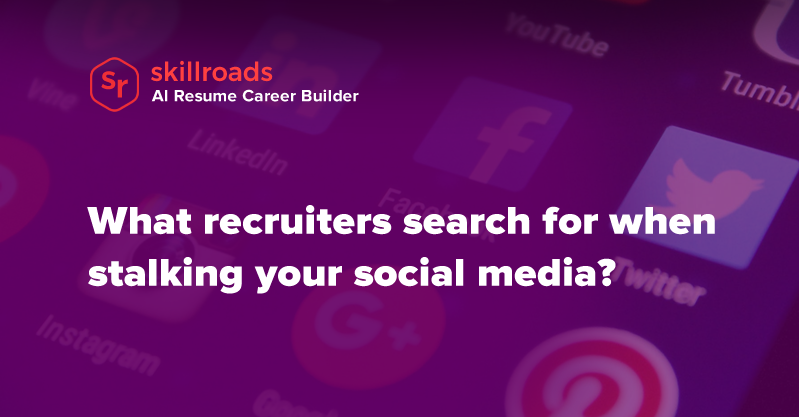
You surely enjoy randomly going through your posts and those of your friends, while making jokes and funny charades? Have you ever ranted about your co-workers and the current job on your LinkedIn, Facebook, Twitter or Instagram accounts? You must have thought that the posts would remain among you and your “friends”. Nothing wrong in doing so, but you might need to think twice. The overwhelming presence of social media in our life has made it an open database for the employers to understand the persona of their targeted employees.
A recently conducted study by CareerBuilder revealed that nearly 70% of recruiters use social media posts to gather information and screen the most potential candidates suitable for hiring. Social media stalking has, therefore, become a return worthy phase of hiring new candidates. When conducting social media background check, they search for good signs as well as bad signs that would help recruiters judge you as an ideal man or woman that they would like to have in office. The good signs, on one hand, include information to support your eligibility as a worthy candidate, your online professional persona, others’ view about you, and any serious reason to give you a chance of employment. The bad signs that the recruiters search for when performing online profiles search may include red flags, such as the use of bad language and signs of not being an obedient and law-abiding person. This would just suggest them to reconsider the eligibility of the person. So now that you know the reasons for employers looking at social media, how about learning what they are searching for?
Facebook can help the prospective employer judge you while hiring
Have you ever received a job offer even when you are not applying actively online? Well, it might be a sign that your social media activities are attracting potential recruiters. Employers have already learned the benefits of using social media and hiring techniques together in a collaborative manner. As they use social media background check for targeting candidates, it is a common process for the recruiters to search Facebook posts for any awful red flags, such as drug abuse, alcoholism, criticizing former or current employers, and spreading dishonest information about qualifications. Therefore, social media profile gives the recruiters some really good reasons for inviting or ignoring a candidate for an interview and giving an exact reflection of the candidates’ professionalism for recruiters offering jobs at Facebook.

Employers also search Twitter account of their targeted candidates
In the virtual world, social media is where people like to hang out and this has turned to be highly influential for online job hiring. When searching for the Twitter account of candidates, employers pay more attention to who you know rather than what you know. Following people in the sector where you intend to search for a suitable job shall be a smart step towards attracting recruiters using social media for hiring decisions. Watching their regular feeds may also offer you with the opportunity to learn about new openings for jobs, significant announcements and many other details that will, in turn, enrich your social presence within the professional domain. Employers looking at social media might also want to assess the usefulness of your shared information with relevance to your professional strengths and weaknesses, and also judge if your tweets are simply meant to provoke arguments with others.
You may become a contender for recruiters’ Google-stalking photo test and Instagram stalk
A common question among candidates searching for a job online is whether they are being stalked by recruiters on social media. So, do employers Google you? The answer is yes they do search for talented employees through Google search but do not have the time to stalk you or other potential candidates online. A key reason for the rise of social media recruiting trends is its added convenience to employers to screen through the candidates’ social persona and assess their professional skills in the most unbiased and accurate manner. Therefore, while the employers may check your LinkedIn profile, they are unlikely to stalk you. Moreover, these platforms are well protected by social media privacy law, which the employers are bound to follow to remain ethical and transparent in their practice of hiring online. This also bars them from stalking you on social media. However, controversies pertain in this regard as a new research revealed that one-third of recruiters confessed of stalking their shortlisted candidates through their online profiles, implying that employees must be savvy about their posts on social media. You may also want to set your profile as private to bar the stalkers in that case, especially for your LinkedIn background check by recruiters, which often functions as a gateway of obtaining further information about your social media presence.

Your Photos Look May Attract Employers to Hire You or Reject
As a job seeker, you may already be aware that using sharp, neatly cropped profile pictures are your first step to attract recruiters to your profile. A profile picture showing you in an unsuitable setting for professional aspirants may have your potential recruiters run away. However, it certainly does not mean that to have your profile designed in an employable manner must be devoid of fun, humor and your true personality within your social sphere. For instance, recruiters’ jobs postings on Facebook aim to search for creative, competent and positive personalities as a whole. Keeping your profiles robotic may, therefore, give them a negative impression or in worse conditions, they might categorize you as older workers without sufficient knowledge of the updated communication technology of the era. During social media account search, the recruiters tend to short-list candidates with up-to-date knowledge of their surroundings, wherein your travel photos, your sense of humor, information about your hobbies, your linguistic skills and your positive reactions of the people around you, work in your favor.
Pay attention to what you post – it reveals a lot about your personality to your recruiters